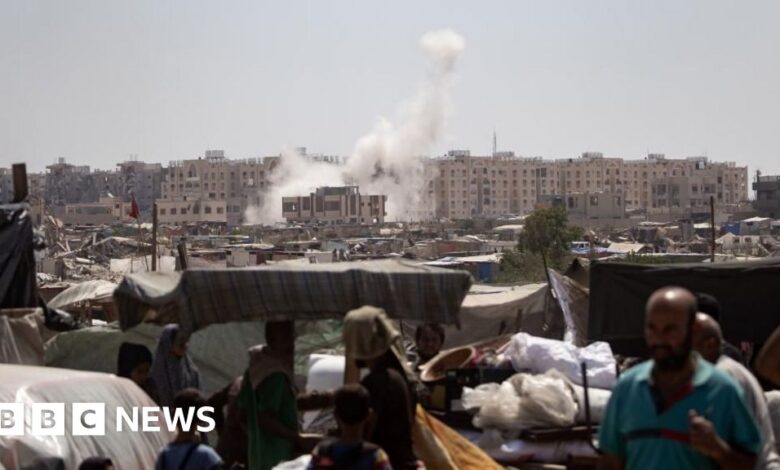Antony Blinken arrives in Israel to negotiate ceasefire in Gaza

US Secretary of State Antony Blinken has arrived in Israel in the latest effort to push for a ceasefire and hostage release deal in Gaza.
His ninth trip to the region since the war began in October came days after the United States put forward a revised proposal aimed at narrowing a long-standing gap between the two sides.
The US and Israel have expressed optimism about a deal since talks resumed in Doha last week, but Hamas has dismissed suggestions of progress as “illusory”.
Differences are said to include whether Israeli troops must withdraw completely from the Gaza Strip, as Hamas insists.
A Hamas source told Saudi media that the proposals included the IDF maintaining a limited presence along the Philadelphi Corridor, a narrow strip of land along Gaza’s southern border with Egypt.
But Israeli sources told the Times of Israel that other border procedures could compensate for Israel’s withdrawal from the area during the first phase of the deal.
The Israeli military launched an operation in Gaza to destroy Hamas in response to an unprecedented attack on southern Israel on October 7, in which some 1,200 people were killed and 251 taken hostage.
More than 40,000 people have died in Gaza since then, according to the Hamas-run territory’s health ministry.
A ceasefire agreed in November saw Hamas release 105 hostages in exchange for a week-long ceasefire and the release of about 240 Palestinian prisoners in Israeli jails. Israel says 111 hostages are still being held, including 39 who are believed to have died.
US President Joe Biden said earlier this week that “we are closer than ever” to a deal.
But the earlier optimism expressed during months of negotiations has proven unfounded.
Israeli Prime Minister Benjamin Netanyahu told a cabinet meeting on Sunday that complex negotiations were underway to secure the release of the hostages, but certain principles needed to be maintained for Israel’s security.
“There are things we can be flexible on, and there are things we can’t be flexible on, and we emphasize those. We know very well how to differentiate between the two,” he said.
He also accused Hamas of being “stubborn” in the talks and called for more pressure to be put on the militant group.
“What we got from the mediators was disappointing. There was no progress at all,” a senior Hamas official told the BBC on Saturday.
The initial deal outlined by President Biden, based on Israel’s May 27 proposal, would be implemented in three phases:
- The first was a six-week “full and comprehensive ceasefire,” in which Israeli troops withdrew from all populated areas in Gaza and a number of hostages — including women, the elderly, the sick or wounded — were exchanged for Palestinian prisoners held in Israel.
- The second phase would include the release of all other surviving hostages and a “permanent cessation of hostilities”.
- Third is to launch a major reconstruction plan for Gaza and return the remains of the dead hostages.
Meanwhile, the Hamas-run health agency in Gaza said Israeli air strikes killed at least 21 people, including six children, on Sunday.
The IDF said on Sunday that it had destroyed rocket launchers used to attack Israel from the southern Gaza city of Khan Younis, which has been the scene of intense fighting in recent weeks, killing 20 Palestinians.




